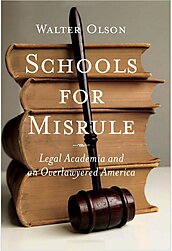“American law schools wield more social influence than any other part of the American university. In Schools for Misrule, Walter Olson offers a fine dissection of these strangely powerful institutions.”
—Wall Street Journal
“Law schools are a hatchery of bad, anti-free-market ideas. These self-dealing professors idealize litigation and impress upon their students a taste for centralized power, thereby strangling our freedom and American entrepreneurship. Olson shines a light on their destructive social engineering.”
—John Stossel, Emmy award-winning consumer reporter and investigative journalist; host of “Stossel” (FOX Business Network)
“While the public loves to bash lawyers, judges, and politicians, law professors have escaped all blame. Olson provides the inside story of how progressive political ideology became the reigning orthodoxy of elite legal education, providing the legal theories responsible for an overweening government committed to mandating, prohibiting, or regulating every aspect of American life in the “public interest.” I wish I could say he exaggerates but, sadly, the legal foundation of the road to serfdom was devised by law professors.”
—Randy E. Barnett, Carmack Waterhouse Professor of Legal Theory, Georgetown Law Center; author of Restoring the Lost Constitution: The Presumption of Liberty
“Every year I hire as law clerks some of the best and brightest law students in the country, and spend a year wringing out of them all the wrong-headed ideas their law professors taught them. Now I know why.”
—Chief Judge Alex Kozinski, U.S. Court of Appeals for the Ninth Circuit
“This hard-hitting, witty account reveals the effect of law on the individual and the collective and astutely forecasts the future of law reform, in the academy, in politics, and across the globe.”
—Publishers Weekly
“With clear and compelling stories, Walter Olson unfolds a morality play of what happens when law goes too far. Schools for Misrule is an important critique of how social policy litigation has corroded democracy and contributed to public polarization and the fiscal crisis.”
—Philip K. Howard, author, The Death of Common Sense; founder, Common Good
